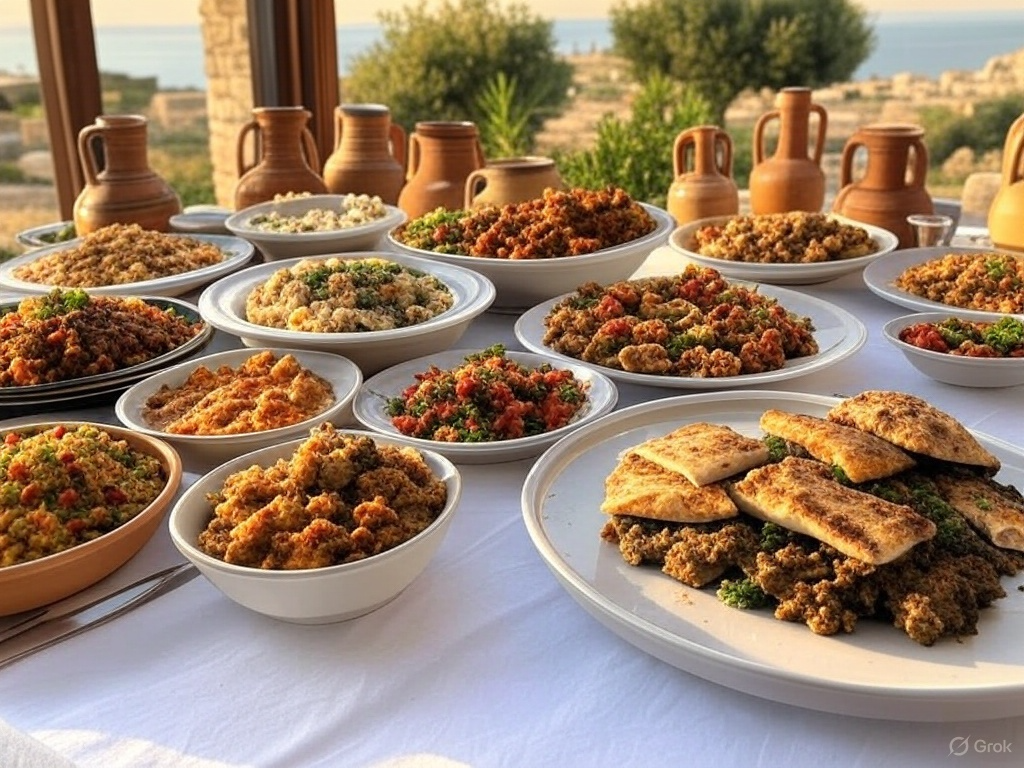Greek food is a reflection of history, geography, and cultural exchanges, evolving over thousands of years through trade, conquest, and migration. Many classic Greek dishes date back to ancient times, blending Mediterranean flavors with influences from the East and West. This rich culinary tradition continues to thrive, preserving both its authenticity and adaptability in the modern world.
Ancient Greek Diet: Simplicity and Freshness
The diet of ancient Greeks was based on the Mediterranean triad, a combination of essential ingredients that formed the foundation of their cuisine:
Olives & Olive Oil – Used for cooking, trade, and religious offerings, olive oil remains a cornerstone of Greek cuisine.
Bread & Grains – Barley and wheat were staples, often used in simple flatbreads and porridge.
Wine – A key part of Greek culture, often diluted with water and enjoyed in social and religious gatherings.
Other important foods included cheese, honey, fish, legumes, and fruits such as figs and grapes. Meat was consumed less frequently, primarily during religious festivals or sacrifices.
Traditional Greek Dishes and Their Origins
Greek cuisine has evolved while maintaining its connection to ancient traditions. Some of its most beloved dishes have deep historical roots:
Moussaka – Inspired by Middle Eastern cuisine, this layered eggplant and meat dish became a Greek staple, particularly influenced by Ottoman culinary traditions.
Souvlaki – Grilled meat skewers date back to ancient Greece, with references found in Homer’s Iliad and archaeological evidence of early skewers.
Dolmades – Stuffed grape leaves originated from a blend of Greek and Ottoman influences, showcasing the region's diverse cultural heritage.
Spanakopita – This spinach and feta-filled phyllo pastry traces its origins to Byzantine times and remains a popular dish in modern Greece.
Baklava – Though often associated with Turkish and Middle Eastern cuisine, variations of this honeyed, nut-filled pastry have long existed in Greek culinary history.
Greek Food in the Modern World
Greek cuisine has influenced global food trends, from the popularity of the Mediterranean diet to the worldwide spread of Greek staples such as Greek yogurt, feta cheese, and gyros. Its emphasis on fresh, simple ingredients, olive oil, and balanced nutrition aligns with modern health-conscious eating habits.
Greek restaurants and tavernas can be found worldwide, bringing traditional dishes and flavors to new audiences. Whether it’s a classic Greek salad, a plate of tzatziki, or a serving of lamb souvlaki, Greek food remains a celebration of taste, tradition, and well-being.
Conclusion
From ancient times to the present day, Greek cuisine continues to reflect the country’s rich history, cultural exchanges, and commitment to fresh ingredients. Whether enjoyed in a traditional village setting or a modern global kitchen, Greek food remains a testament to the power of culinary tradition and innovation.









